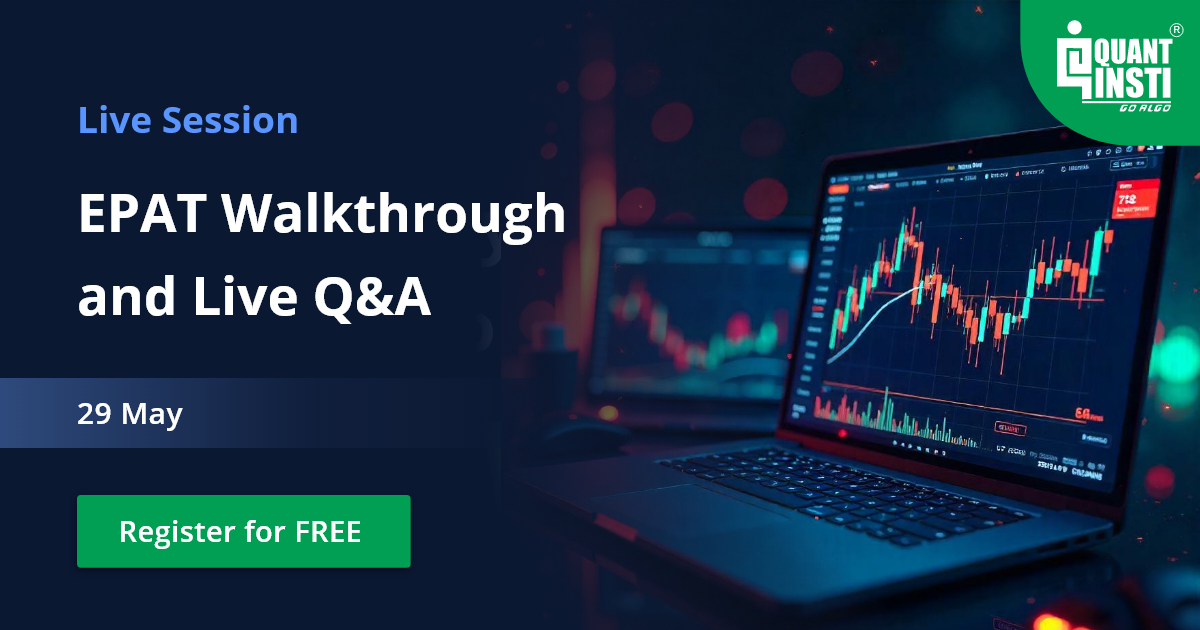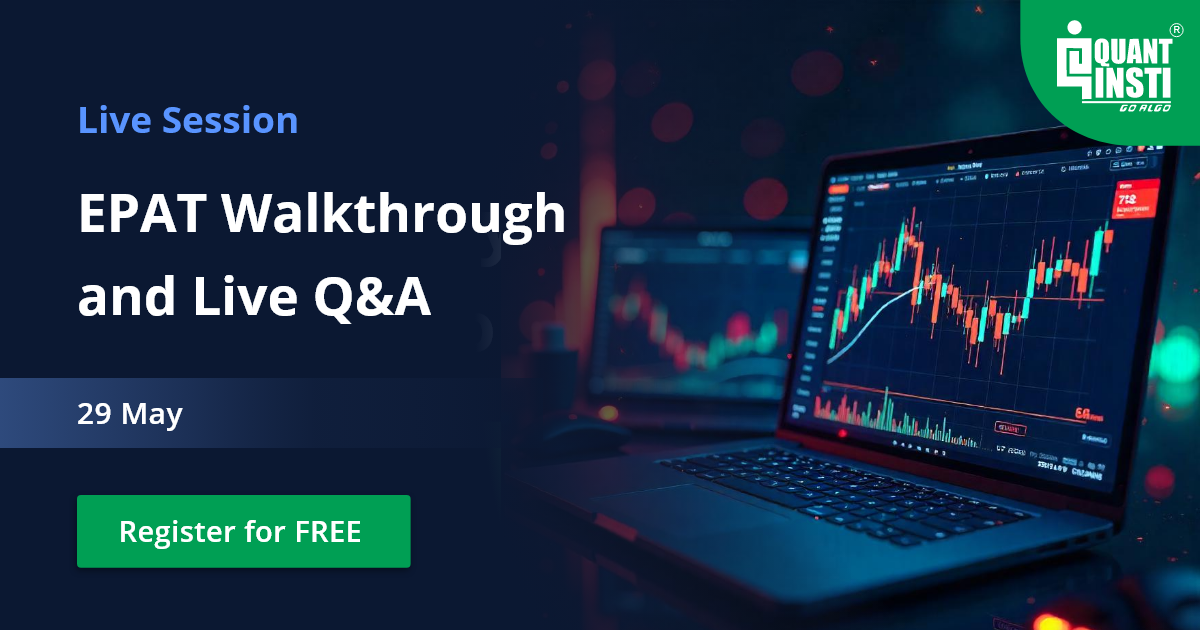Angela Zhao hails from Canada and is a Finance grad with a Masters in Data Analytics. She has worked across multiple roles as an analyst, researcher, and now a data scientist across various firms in both the technology and financial sectors.
Angela believes:
Applying concepts that you learn is very important because that’s the only way to benefit from what you’ve learnt.
Now an EPATian, she holds the EPAT Certificate of Excellence and has benefited from the EPAT community. Angela shares her journey of Algorithmic Trading with us. This is her success story.
Hi Angela, tell us about yourself

My name is Angela Zhao and I'm based out of Toronto, Ontario in Canada. I did my undergraduate degree studies in finance and then worked in investment management for 2 years at a mutual fund.
I spent a few years doing machine learning at a tech company and recently switched to a new position at a pension fund. All of the knowledge I gained from EPAT has really helped me make this kind of transition.
Being from the Machine Learning industry, I pursued ML courses, conferences, read papers, and always kept up to date with the industry trends. I dabbled in discretionary trading when I was in high school and university, but after I started working 9 to 5, I could no longer trade during market hours. I could manage long-term investments but had to give up short-term trading.
That was when I just thought,
Oh, it would be great if I could automate my trading! That way, I won’t have to look at it while I'm working.
That was one of my first motivations for getting into Algo Trading.
From a bachelor's degree in commerce to a full-fledged data scientist. That’s quite an interesting journey. How did that happen?
Quantitative finance is a very difficult industry to break into, especially in Toronto because there aren't as many investment firms or hedge funds here compared to New York or Chicago. I wanted to be more competitive so I decided to get a Masters in Data Analytics. After my Masters, I spent three years doing machine learning at a tech company.
When I started working in finance, it was more along the lines of fundamental and discretionary investing. I was picking equities and fixed income products based on the company's fundamentals. I was reading annual reports and conducting due diligence on these companies, trying to figure out if they were good long-term investments. I also did two levels of my CFA.
I noticed that a lot of the money was flowing into the quantitative funds, and everything was increasingly being automated. Over a period of time, my interests moved towards algorithmic trading and into something that's more quantitative.
I was more interested in building a scalable strategy that can be easily reproducible across asset classes. That's what motivated me to learn more about quantitative finance and algorithmic trading.
This led me to the EPAT programme. After completing the programme, I wanted to further improve my technical skills, so I obtained a Masters in Data Analytics from Western University. Since then, I have been working in machine learning.
Due to time constraints, I trade independently as a hobby now. I mostly trade futures and sometimes equities. My future career goal is to become an algorithmic trader at an investment firm.
Becoming a data scientist at a pension fund where I build the financial models, helps me move closer to that goal.
According to you, what is the importance of Statistics in Algo Trading?
I feel like if you don't understand statistics, you won't even understand the results that you're getting. There are many biases that may be embedded in backtest results, and people who lack an understanding of statistics may overlook them.
People who are just new to algorithmic trading only look at absolute returns and ignore the other facets. They don’t measure risk, which is a crucial element of trading.
It’s important to look at risk-adjusted measures such as the Sharpe ratio or Sortino ratio, and other risk metrics such as the maximum drawdown. A solid foundation in statistics can help you better understand what these metrics are telling you.
How important was your learning at EPAT?
My initial motivation to get into algo trading was to automate my strategy so it wouldn’t interfere with my 9 to 5 job. Working full-time, I could invest, but I couldn't do short-term trading. It was during this time that I was looking online for different resources to help me get into algorithmic trading.
I found some YouTube channels or blogs but they were too basic. They would teach you how to make a rudimentary training program like a 'Hello World' for algo trading but don't really get into any of the specifics. They don't even cover a lot of crucial topics like cointegration and other statistical concepts.
I wanted something more comprehensive. And after doing a lot of research, I found that EPAT was probably one of the most comprehensive programs out there. I believed EPAT would help me dive deeper into the world of algorithmic trading.
In addition, I looked at the faculty on the board and they are people who have real-life experience with algo trading as opposed to academicians who only understand the theory. So, that's why I picked EPAT.
The EPAT curriculum is very broad and taught me everything I needed to know about quant trading.
Which feature of EPAT do you like the most?
I don’t think it’s one particular stand-out feature that makes EPAT such a great programme – it’s all the things put together. The curriculum, the faculty, and the chance to apply what you learn with the projects - they all add to the experience.
The Placement Team
The placement team has been incredibly helpful. They always answer any questions I have about potential roles, and they also follow up with me consistently.
Even after I’ve graduated, the EPAT Placement Team checks up on me just to make sure that I'm following the career path. They frequently enquire about my interest in a particular job position. They are very proactive that way and keep sharing various job opportunities. I appreciate that a lot!
The Faculty
I think that the faculty at QuantInsti is phenomenal! If you ask them a question, they reply quite promptly.
The Support
It is the same with placement and support teams. If I ever have any question, or I just ask them any queries I have and even if they don't know the answer, they will ask and reply very quickly. It has been very helpful talking to these wonderful people.
I think the main benefit of EPAT is that it taught me the best practices of algorithmic trading which I wouldn’t have known until I actually got into it.
What message would you give to those who wish to pursue algo trading?
The biggest tip I can give to people is:
DON’T be intimidated by Algo Trading.
I think a lot of people look at the industry and see it is dominated by PhDs or people with a lot of degrees. They feel they can't do it unless they have the same credentials and knowledge. But a course like EPAT provides everyone with the necessary knowledge and trains people to be fully capable of creating and implementing strategies on their own.
Even the people that have the knowledge are sometimes too scared to implement anything because they feel like they can't do it. When they actually try, they realize that they’ve always been capable of doing it.
I encourage everyone to go out and try it for themselves and see how accessible quantitative and algorithmic trading really is.
Thank you so much, QuantInsti for all your support over these years!
Thank you for your time and for sharing your journey with us, Angela. We're sure our readers would be able to relate to your journey and be guided by your experience. Kind words from some fine individuals like yourself, really make the difference and make us go the extra mile. Best wishes for your future.
The Executive Programme in Algorithmic Trading (EPAT) is a comprehensive course covering topics ranging from Statistics & Econometrics to Financial Computing & Technology including Machine Learning and more. Start your quest to upgrade your knowledge of Algorithmic Trading with EPAT. Check it out here.
Disclaimer: All data and information provided in this article are for informational purposes only. QuantInsti® makes no representations as to accuracy, completeness, currentness, suitability, or validity of any information in this article and will not be liable for any errors, omissions, or delays in this information or any losses, injuries, or damages arising from its display or use. All information is provided on an as-is basis.


